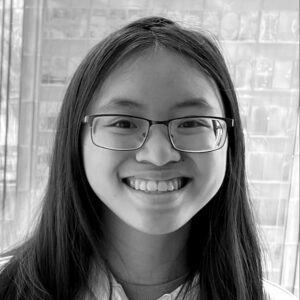Trini Feng
I am shoulder to shoulder with a man I don’t know the name of,
waiting for my father to return.
He does with steps thundering, face red,
a phone in one trembling hand and an empty plate in the other.
We are family, so I bear witness, and I do not ask.
and we do not speak.
I am scared that he won’t, scared that he will, scared of my fear,
and I wonder if he remains because he is chained.
Another link breaks, a fracture unseen.
On the sidewalk I stroll down, a house is for sale.
A red sign screams this as if I’m too dull to know otherwise,
and with that certainty that she is gone, I turn and continue walking.
Wherever she went, it must be far away.
We were friends, and I stopped asking questions long ago.
She wasn’t one to linger, but I did,
perched on her yard like a bird who has forgotten how to fly.
She always responds late to me, so now I answer my question myself,
as we were not meant to be home.
The nights are breathless lately, the air muggy,
so I stay home. I find warmth instead in my laughter,
which rings loud enough that they can hear from the other end of the world.
I met them by chance, but it’s by choice that I stay with them now.
We are friends, we are family, and we find each other.
and though I can’t lie under the stars, I watch them for what they hold,
a light I only recently began to look to and bask in.
I imagine it flaring in my chest, store it next to the hope in my heart:
one day, I will live in a place I can call home.
Trini Feng
On my eighteenth birthday, you showed up on my doorstep with two shovels. “Big day,” you said, passing one to me, the handle rusted and worn.
We stepped off the porch into my wild backyard, where the grass reached our knees and weeds scratched at our heels. It wasn’t like your birthday three months before, when we breathed in the warm fumes of your oven. The timer beeped; we ran to stuff our faces with chocolate cake. We had grinned at each other, lips and teeth stained brown.
Like we ate dirt, you said.
I had laughed. It was good dirt.
Dirt, like the soil we had overturned looking for the worm you had cradled in your palm—it probably has a family, you cried, one that loves it. Dirt, brown like your eyes that lit up when soft chirps welcomed a mother bird back to its nest. You said sometimes that you felt a certain kinship with nature, and I said it could be that your eyes were molded from the earth itself.
I won’t forget your response, though it was years ago, when we were still wild, uncertain children. You told me that you loved what renewed your hope for life; that was the earth in springtime, but in the harsh winters, it was my presence that promised you the sun.
I was fifteen when you raced to my front porch, tears in your trail. Through wracked sobs, you told me that the TV had aired an ad with two married women. Within a second, you leaned forward. That same second, your mother picked up the remote and turned on old sitcom reruns.
Later, lying under the stars, you said your name, your body, your pronouns—things so taken for granted—didn’t feel right. I said I couldn’t understand why anyone wanted to date or marry so badly. It was the first voice I had given to my feelings; our small hometown had drowned them out in old expectations to don skirts and blow kisses.
That year, June had been blisteringly hot, but we stayed outside for the parades anyway. We sprinted home long after dusk had dimmed the vibrant colors. The muggy night air threatened to suffocate us, but we had never felt freer. In our hands, rainbow pinwheels lay still. They were gentle souls, waiting for a breeze to spirit them away. Why our homes considered them hellish tokens, I didn’t know, but they were our treasure.
So we broke into your grandfather’s old barn, sweeping away the cobwebs barring us from the shovels. We lowered those pinwheels into the earth of my backyard like dearly departed relatives, but there was no funeral ceremony. Our tears were wiped away, our mourning buried.
Those around us would mutter about the insincerity of it, the unnatural way people loved or didn’t love. When they did, I closed my eyes and laid a hand on your shoulder. I supported you; as you shook in rage, I steadied you. I thought of our pinwheels, of our truth mingling with the soil. And I said nothing. I let the words, ringing clear and true, die in my mouth, and I cloaked their rotting scent with fragrant flowers and shining smiles. My mind deteriorated into a graveyard of thoughts, each new gouge in the ground wearing me down.
With a smile on your face, you approached me. Let’s rob a grave, you said. Steal something back.
I didn’t smile then—but here in this backyard, I did. Here, where Mother Earth reigned free of human conventions, I unchained my heart.
We dug our shovels into the ground.

TRINI FENG is a high school senior. Born and raised in suburban Illinois, she likes to explore both the mundane and speculative in her writing. Particularly, she loves writing about people, namely their interactions with each other and their world. Her work has previously been published in The WEIGHT Journal, Bluefire, and Ice Lolly Review, among others. In her free time, she dabbles in music, video games, and coding.